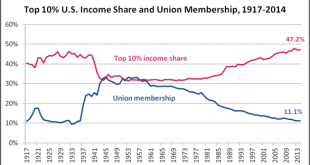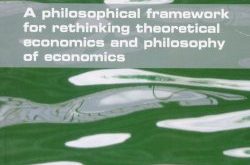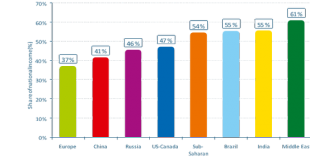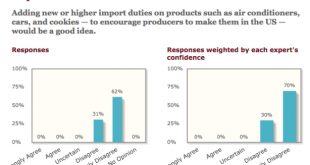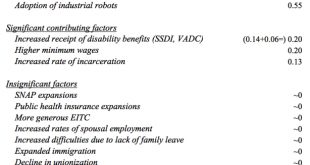Source: Economic Policy Institute
Read More »Beware what you ask for
from Peter Radford This has been a long and miserable time. Deluged daily by strange and almost surrealistic gyrations in Washington I decided to sit to one side and simply watch. The spectacle of America rapidly decaying and apparently unable to prevent itself from gnawing away at its institutions is compelling. The regular attempts to undermine the credibility of everything meant to act as a bastion against tyranny is riveting. The subsequent indulgence in endless introspection about...
Read More »On testing and learning in a non-repetitive world
from Lars Syll The incorporation of new information makes sense only if the future is to be similar to the past. Any kind of empirical test, whatever form it adopts, will not make sense, however, if the world is uncertain because in such a world induction does not work. Past experience is not a useful guide to guess the future in these conditions (it only serves when the future, somehow, is already implicit in the present) … I believe the only way to use past experience is to assume that...
Read More »Top 10% national income share across the world, 2016
Utopia and trade
from David Ruccio Donald Trump’s decision to impose import tariffs—on solar panels and washing machines now, and perhaps on steel and aluminum down the line—has once again opened up the war concerning international trade. It’s not a trade war per se (although Trump’s free-trade opponents have invoked that specter, that the governments of other countries may retaliate with their import duties against U.S.-made products), but a battle over theories of international trade. And those...
Read More »The biggest trouble with modern macroeconomics
from Lars Syll The trouble is not so much that macroeconomists say things that are inconsistent with the facts. The real trouble is that other economists do not care that the macroeconomists do not care about the facts. An indifferent tolerance of obvious error is even more corrosive to science than committed advocacy of error. Paul Romer New-Classical-Real-Business-Cycles-DSGE-New-Keynesian microfounded macromodels try to describe and analyze complex and heterogeneous real economies...
Read More »Where have all the workers gone?
from David Ruccio U.S. capitalism has a real problem: there don’t seem to be enough workers to keep the economy growing. And it has another problem: capitalists themselves are to blame for the missing workers. As is clear from the chart above, the employment-population ratio (the blue line) has collapsed from a high of 64.4 in 2000 to 59 in 2014 (and had risen to only 60.1 by the end of 2017).* During the same period, the average real incomes of the bottom 90 percent of Americans have...
Read More »It wasn’t the market that made elites incredibly rich, it was elites rigging the market to make themselves incredibly rich
from Dean Baker It is amazing how frequently we hear people asserting that the massive inequality we are now seeing in the United States is the result of an unfettered market. I realize that this is a convenient view for those who are on the upside of things, but it also happens to be nonsense. Today’s highlighted nonsense pusher is Amy Chua, who warns in a NYT column about the destructive path the United States is now on where an disaffected white population takes out its wrath on...
Read More »Keeping the dream alive
from Lars Syll For me, the study of asymmetric information was a very first step toward the realization of a dream. That dream was the development of a behavioral macroeconomics in the original spirit of Keynes’ General Theory. Macroeconomics would then no longer suffer from the ad hockery of the neoclassical synthesis, which had over-ridden the emphasis in The General Theory on the role of psychological and sociological factors, such as cognitive bias, reciprocity, fairness, herding, and...
Read More »Keynes’ core insight
from Lars Syll But these more recent writers like their predecessors were still dealing with a system in which the amount of the factors employed was given and the other relevant facts were known more or less for certain … At any given time facts and expectations were assumed to be given in a definite and calculable form … The calculus of probability, tho mention of it was kept in the background, was supposed to be capable of reducing uncertainty to the same calculable status as that of...
Read More » Real-World Economics Review
Real-World Economics Review

